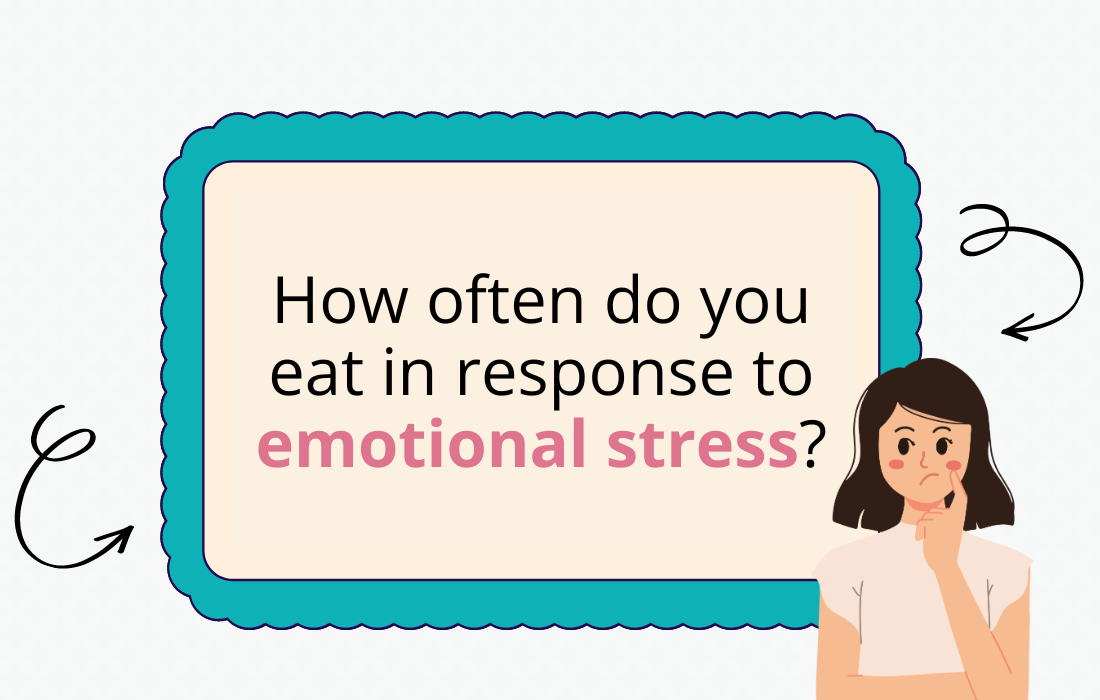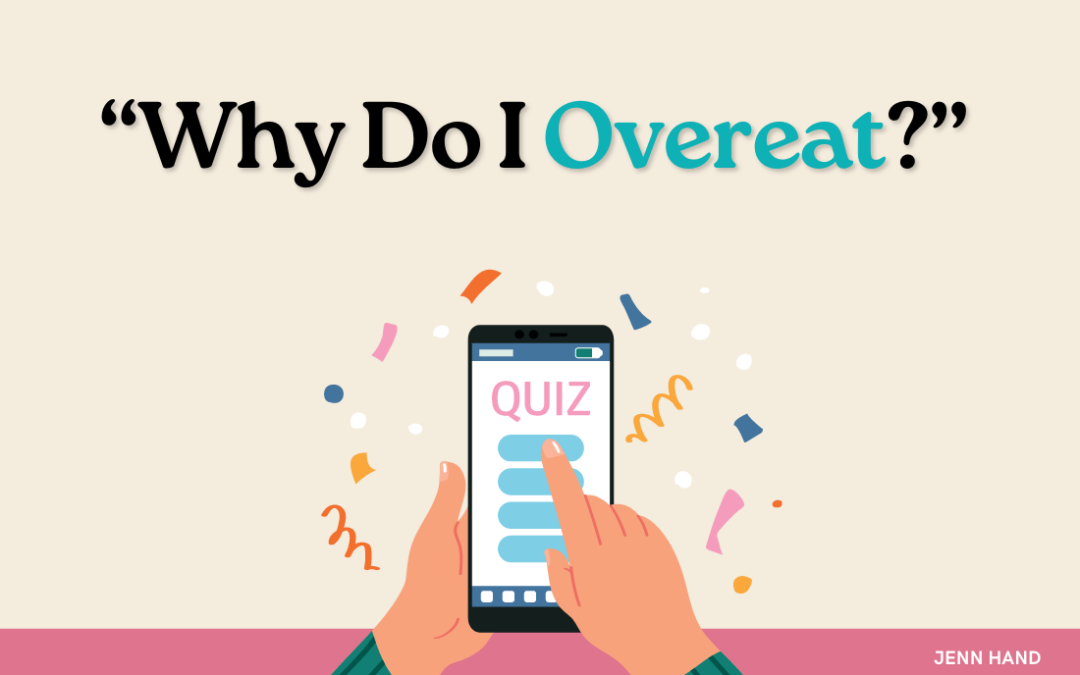Discover why you overeat!
Written by Jenn Hand, Holistic Nutritionist, Board Certified Health Coach, NBC-HWC
Understanding why we overeat is a step towards developing a healthier relationship with food.
Whether it’s emotional eating, mindless snacking, habitual behaviors, or rebellion against restrictive diets, this quiz aims to help you identify patterns and gain insight into your eating habits.
Take the quiz to explore the potential reasons behind your overeating tendencies and begin your journey towards a more balanced and mindful approach to eating.
Take the quiz and count how many answers you have for A, B, C and D.
Quiz Questions:
1. How do you feel right before you overeat?
a) Stressed, anxious, or a feeling I want to avoid
b) Bored or lonely
c) I’m not sure–I don’t pay much attention
d) Anxious or guilty about breaking diet rules
2. What time of day are you most likely to overeat?
a) Late at night
b) During the afternoon slump
c) There’s no real pattern I can pinpoint–it just seems to happen
d) After a day of strict dieting or calorie counting
3. Where do you most often find yourself overeating?
a) In front of the TV, computer, or when I’m by myself
b) At social gatherings or parties
c) It depends on my day–I could eat anywhere
d) In moments of rebellion against dieting norms or rules
4. What types of food do you usually overeat?
a) Sweet or sugary snacks
b) Salty or savory snacks
c) High-carb or comfort foods
d) Foods that are off-limits or restricted on my current plan
5. Do you eat differently when you’re alone compared to with others?
a) Yes, I tend to eat more when I’m alone
b) No, my eating habits are consistent regardless of company
c) I eat less when I’m alone
d) Yes, I tend to indulge more when no one is watching
6. How do you feel after overeating?
a) Guilty or ashamed
b) Content or satisfied
c) Physically uncomfortable or bloated
d) Satisfied and rebellious against food restrictions
7. Do you find yourself eating even when you’re not hungry?
a) It usually depends on my emotional state
b) Occasionally
c) Rarely
d) Yes, especially when I feel deprived or restricted
8. How often do you eat in response to emotional stress?
a) Almost always
b) Sometimes
c) Rarely
d) Often, particularly when I’m frustrated with dieting
9. Do you plan your meals in advance?
a) Rarely or never
b) Sometimes, but not consistently
c) Yes, most of the time
d) Yes, I strictly adhere to my planned meals, even if I feel rebellious
10. How would you describe your awareness of hunger and fullness signals?
a) I often ignore them or can’t distinguish them
b) I’m somewhat aware but sometimes override them
c) I’m fairly in tune with my hunger and fullness cues
d) I often ignore them in favor of sticking to my diet rules

Mostly A’s: Emotional Eater
If you find yourself turning to food in response to emotional stress or to cope with difficult feelings such as anxiety, sadness, or boredom, you may fall into the category of an emotional eater.
Emotional eating often involves using food as a way to soothe or distract yourself from uncomfortable emotions. You might notice a pattern of overeating when feeling overwhelmed or seeking comfort, leading to guilt or shame afterward.
Mostly B’s: Mindless Eater
Mindless eating occurs when you consume food without paying attention to your body’s hunger and fullness signals or without being fully aware of what and how much you’re eating.
This can happen when you’re distracted, such as while watching TV or scrolling through your phone, or when you’re eating out of habit rather than true physical hunger.
Mindless eating can result in overeating without even realizing it, leading to feelings of discomfort or dissatisfaction afterward.
Mostly C’s: Habitual Eater
Habitual eating involves ingrained patterns of behavior or routines around food consumption, often without much thought or conscious decision-making.
You might find yourself overeating at certain times of the day out of habit, such as snacking while watching TV in the evening or reaching for a sugary treat after lunch.
These habits can be difficult to break, even if you’re not necessarily eating due to hunger, and may contribute to overconsumption without mindful awareness.
Mostly D’s: Rebellious Eater
If you often rebel against restrictive eating patterns, dieting rules, or feelings of deprivation, you may fall into the category of a rebellious eater.
This can manifest as overeating in response to perceived food restrictions, whether self-imposed or externally imposed by diet culture.
You might find yourself consuming large quantities of “forbidden” foods or rebelling against rigid meal plans, leading to feelings of guilt or frustration afterward.
Related Articles
⚪ How to Stop Overeating: 27 Things I’ve Done that Work
⚪ Emotional Eating Quiz
⚪ The Biggest Cause of Overeating at Night
Get the Normal Eater’s Newsletter
Join 8000+ women who are overcoming overeating, binge eating, and breaking up with dieting forever. Get Jenn’s inspiring and actionable weekly newsletter with the latest posts, podcasts, and tips on how to love your body, find food freedom, and lose weight holistically.
Get the Normal Eater’s NewsletterWork with an Emotional Eating Coach
Overcome Bingeing and Emotional Eating, and Break Up with Yo-yo Dieting
Working with an emotional eating coach or food relationship coach can help you get free from yo-yo dieting and the binge-restrict cycle.
You don’t have to be obsessed with food or have a million rules around eating to find your natural weight and learn to love your body. Ready to actually see a lasting change and experience true freedom?
Schedule a 20-min CallAbout the Author:

Jenn Hand has been helping women like you become normal eaters since 2015.
She’s worked with thousands of women, helping them to balance their bodies, end bingeing, stop obsessing over food, and start feeling amazing again. As a board-certified health coach and holistic nutritionist, Jenn knows how to support you in making real positive changes that last.
Her articles have been published on Mind Body Green, Tiny Buddha, Thrive Global and other local and global media platforms. She’s the author of How to Be a Normal Eater and the creator of The Normal Eater’s Club program. Listen to Jenn’s advice and tips on the Cake Doesn’t Count Podcast, or read more of her articles for free on the Food Freedom Blog.
Learn About Coaching!




